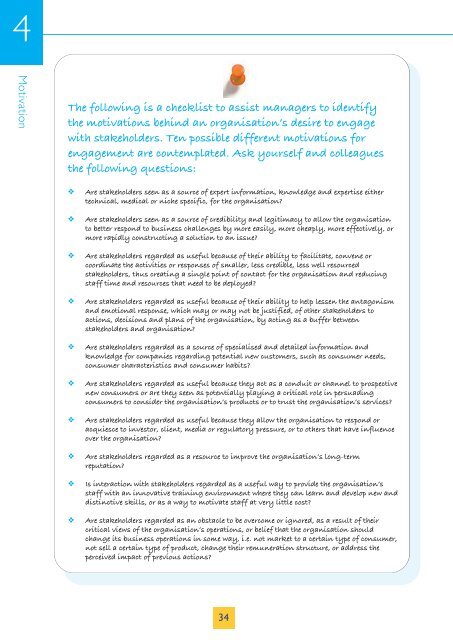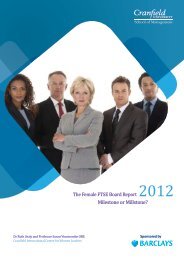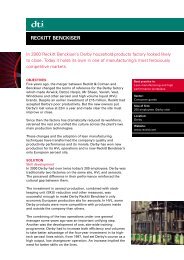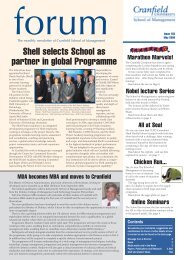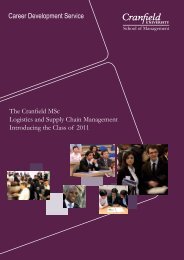Stakeholder Engagement - Cranfield School of Management ...
Stakeholder Engagement - Cranfield School of Management ...
Stakeholder Engagement - Cranfield School of Management ...
Create successful ePaper yourself
Turn your PDF publications into a flip-book with our unique Google optimized e-Paper software.
4<br />
Motivation<br />
The following is a checklist to assist managers to identify<br />
the motivations behind an organisation’s desire to engage<br />
with stakeholders. Ten possible different motivations for<br />
engagement are contemplated. Ask yourself and colleagues<br />
the following questions:<br />
❖ Are stakeholders seen as a source <strong>of</strong> expert information, knowledge and expertise either<br />
technical, medical or niche specific, for the organisation?<br />
❖ Are stakeholders seen as a source <strong>of</strong> credibility and legitimacy to allow the organisation<br />
to better respond to business challenges by more easily, more cheaply, more effectively, or<br />
more rapidly constructing a solution to an issue?<br />
❖ Are stakeholders regarded as useful because <strong>of</strong> their ability to facilitate, convene or<br />
coordinate the activities or responses <strong>of</strong> smaller, less credible, less well resourced<br />
stakeholders, thus creating a single point <strong>of</strong> contact for the organisation and reducing<br />
staff time and resources that need to be deployed?<br />
❖ Are stakeholders regarded as useful because <strong>of</strong> their ability to help lessen the antagonism<br />
and emotional response, which may or may not be justified, <strong>of</strong> other stakeholders to<br />
actions, decisions and plans <strong>of</strong> the organisation, by acting as a buffer between<br />
stakeholders and organisation?<br />
❖ Are stakeholders regarded as a source <strong>of</strong> specialised and detailed information and<br />
knowledge for companies regarding potential new customers, such as consumer needs,<br />
consumer characteristics and consumer habits?<br />
❖ Are stakeholders regarded as useful because they act as a conduit or channel to prospective<br />
new consumers or are they seen as potentially playing a critical role in persuading<br />
consumers to consider the organisation’s products or to trust the organisation’s services?<br />
❖ Are stakeholders regarded as useful because they allow the organisation to respond or<br />
acquiesce to investor, client, media or regulatory pressure, or to others that have influence<br />
over the organisation?<br />
❖ Are stakeholders regarded as a resource to improve the organisation’s long-term<br />
reputation?<br />
❖ Is interaction with stakeholders regarded as a useful way to provide the organisation’s<br />
staff with an innovative training environment where they can learn and develop new and<br />
distinctive skills, or as a way to motivate staff at very little cost?<br />
❖ Are stakeholders regarded as an obstacle to be overcome or ignored, as a result <strong>of</strong> their<br />
critical views <strong>of</strong> the organisation’s operations, or belief that the organisation should<br />
change its business operations in some way, i.e. not market to a certain type <strong>of</strong> consumer,<br />
not sell a certain type <strong>of</strong> product, change their remuneration structure, or address the<br />
perceived impact <strong>of</strong> previous actions?<br />
34


